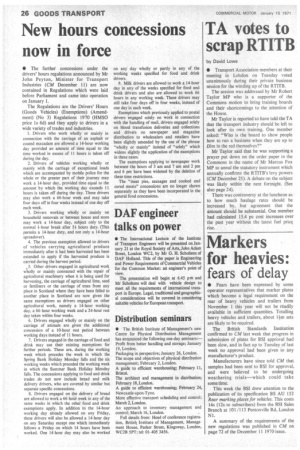New hours concessions now in force
Page 28

If you've noticed an error in this article please click here to report it so we can fix it.
• The further concessions under the drivers' hours regulations announced by Mr John Peyton, Minister for Transport Industries (CM December 11) are now contained in Regulations which were laid before Parliament and came into operation on January 1.
The Regulations are the Drivers' Hours (Goods Vehicles) (Exemptions) (Amendment) (No 3) Regulations 1970 (HMSO price is 6d) and they apply to drivers in a wide variety of trades and industries.
1. Drivers who work wholly or mainly in connection with the carriage of an asphalt or coated macadam are allowed a 14-hour working day provided an amount of time equal to the time worked in excess of 11 hours is taken off during the day.
2. Drivers of vehicles working wholly or mainly with the carriage of exceptional loads which are accompanied by mobile police for the whole or the greater part of their journey may work a 14-hour day, provided time equal to the amount by which the working day exceeds 11 hours is taken off during the day. These drivers may also work a 66-hour week and may take four days off in four weeks instead of one day off each week.
3. Drivers working wholly or mainly on household removals or between house and store may work a I4-hour day, subject only to the normal 4-hour break after 54. hours duty. (This permits a 14-hour duty, and not only a 14-hour spreadover).
4. The previous exemption allowed to drivers of vehicles carrying agricultural produce immediately after it had been harvested has been extended to apply if the harvested produce is carried during the harvest period.
.5. Other drivers engaged in agricultural work wholly or mainly connected with the repair of agricultural machinery when it is being used for harvesting, the carriage of agricultural lime, seed or fertilisers or the carriage of trees from any place in Scotland where they have been felled to another place in Scotland are now given the same exemptions as drivers engaged on other agricultural work, namely a 14-hour working day, a 66-hour working week and a 24-hour rest day taken within four weeks.
6. Drivers engaged wholly or mainly on the carriage of animals are given the additional concession of a 10-hour rest period between working days instead of 11 hours.
7. Drivers engaged in the carriage of food and drink may use their existing exemptions for further periods. These are, during the working week which precedes the week in which the Spring Bank Holiday Monday falls and the six working weeks which preceded the working week in which the Summer Bank Holiday Monday falls. The concessions applying to food and drink trades do not now include bread and milk delivery drivers, who are covered by similar but separate specific concessions.
8. Drivers engaged on the delivery of bread are allowed to work a 66-hour week in any of the same weeks in which the other food and drink exemptions apply. In addition to the 14-hour working day already allowed on any Friday, these drivers will also be allowed a 14-hour day on any Saturday except one which immediately follows a Friday on which 14 hours have been worked. One 14-hour day may also be worked on any day wholly or partly in any of the working weeks specified for food and drink drivers.
9. Milk drivers are allowed to work a 14-hour day in any of the weeks specified for food and drink drivers and also are allowed to work 66 hours in any working week. These drivers may still take four days off in four weeks, instead of one day in each week.
Exemptions which previously applied to postal drivers engaged solely on work in connection with the handling of mail, drivers engaged solely on blood transfusion deliveries and collections and drivers on newspaper and magazine distribution to wholesalers and retailers have been slightly amended by the use of the phrase "wholly or mainly" instead of "solely" which widens slightly the application of the exemptions in these cases.
The exemptions applying to newspaper work between the hours of 3 am and 7 am and 2 pm and 6 pm have been widened by the deletion of these time restrictions.
The "meat pies, sausages and cooked and cured meats" concessions are no longer shown separately as they have been incorporated in the general food concessions.




































































































































